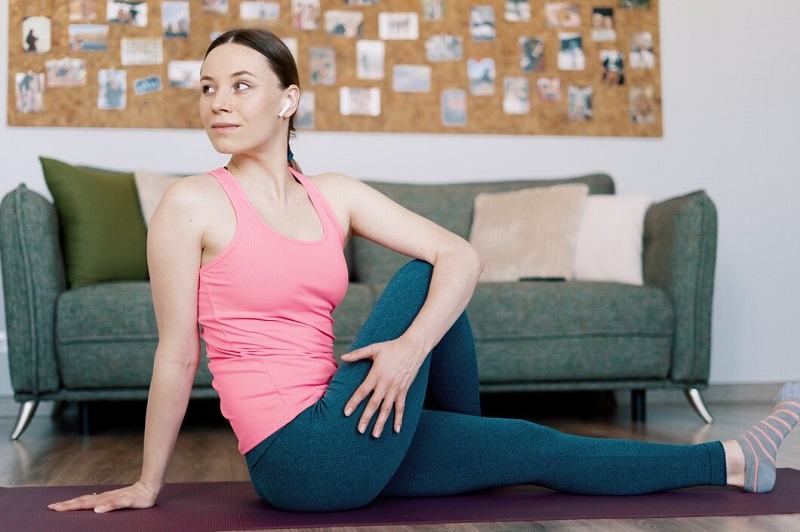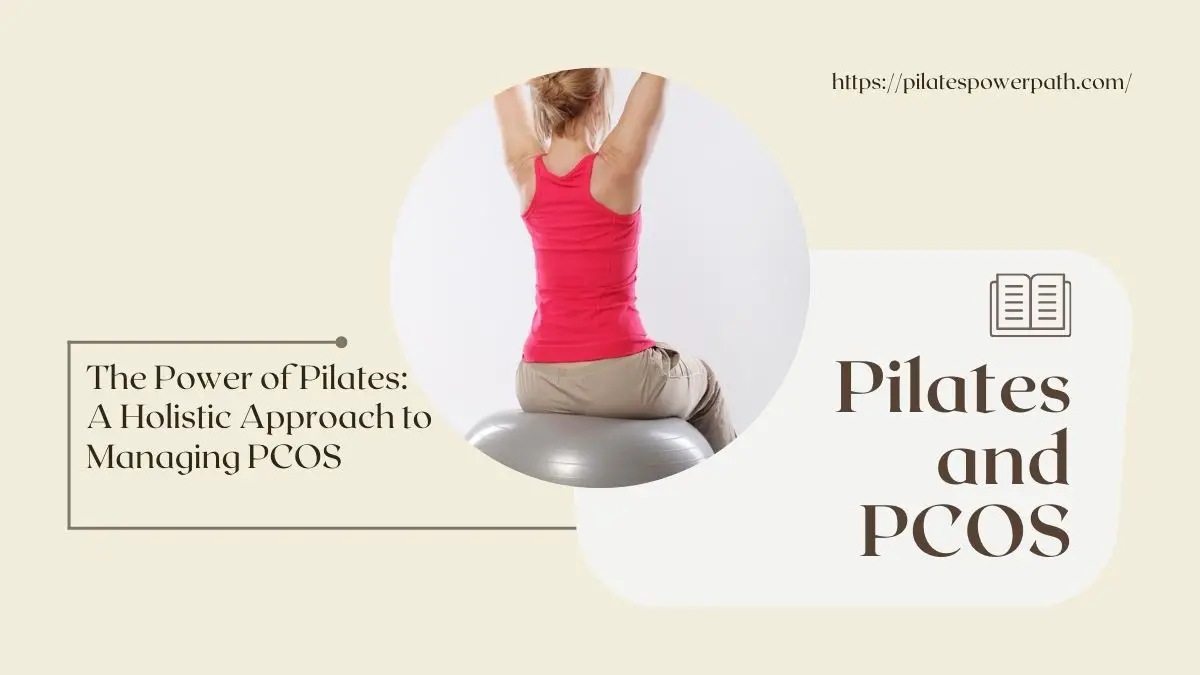Welcome to our journey of exploring how Pilates, a form of exercise that focuses on strength, flexibility, and mind-body connection, can be a game-changer in managing PCOS (Polycystic Ovary Syndrome). PCOS affects millions of women worldwide, causing a range of symptoms from irregular periods to infertility and metabolic issues. But fear not, because alongside conventional treatments, incorporating Pilates into your routine can offer holistic benefits for managing PCOS symptoms and improving overall well-being.
Understanding PCOS
Definition and Common Symptoms of PCOS
PCOS is a hormonal disorder characterized by imbalanced reproductive hormones, leading to irregular periods, ovarian cysts, and other symptoms like acne, weight gain, and excess hair growth. It affects women of reproductive age and can impact physical and mental health.
Impact of PCOS on Women’s Health
Beyond its physical symptoms, PCOS can affect mental health, self-esteem, and fertility. It increases the risk of developing other health conditions like type 2 diabetes, cardiovascular diseases, and endometrial cancer.
Read More: The Marvels of Pilates: Exploring the Benefits of Weekly Practice
Challenges in Managing PCOS Symptoms
Managing PCOS can be challenging due to its varied symptoms and underlying hormonal imbalances. Conventional treatments often focus on symptom management but may not address the root causes or offer holistic support.
The Role of Exercise in PCOS Management
Importance of Regular Exercise in PCOS Management
Exercise plays a crucial role in managing PCOS by improving insulin sensitivity, promoting weight loss, reducing inflammation, and enhancing mood and stress management. It can help regulate menstrual cycles and improve fertility in women with PCOS.

Benefits of Exercise for Women with PCOS
For women with PCOS, incorporating regular exercise into their routine can lead to significant improvements in hormonal balance, metabolic health, and overall well-being. Exercise helps lower androgen levels, improve insulin sensitivity, and reduce the risk of complications associated with PCOS.
Types of Exercise Recommended for PCOS Patients
Various forms of exercise can benefit women with PCOS, including aerobic exercise, strength training, high-intensity interval training (HIIT), and mind-body exercises like yoga and Pilates. Each type of exercise offers unique benefits and can be tailored to individual preferences and fitness levels.
Introduction to Pilates
Brief History and Principles of Pilates
Pilates was developed by Joseph Pilates in the early 20th century as a system of exercises aimed at improving strength, flexibility, and body awareness. It emphasizes core strength, proper alignment, and controlled movements, promoting a balanced and efficient body.
Overview of Pilates Exercises and Equipment
Pilates exercises can be performed on a mat or using specialized equipment such as reformers, Cadillac, and chairs. Mat Pilates focuses on bodyweight exercises, while equipment-based Pilates incorporates resistance to enhance strength and flexibility.
Benefits of Pilates for Overall Health and Fitness
Pilates offers numerous benefits for overall health and fitness, including improved core strength, flexibility, posture, and balance. It helps alleviate back pain, enhances athletic performance, and promotes relaxation and stress relief.
Pilates for PCOS Management
How Pilates Can Address Specific Symptoms of PCOS
Pilates can be particularly beneficial for women with PCOS due to its focus on core strength, flexibility, and mind-body connection. It helps improve insulin sensitivity, promote weight loss, reduce stress, and regulate menstrual cycles.

Importance of Core Strength and Flexibility
Core strength is essential for supporting the spine, maintaining proper posture, and preventing injuries. Pilates exercises target the deep core muscles, including the abdominals, obliques, and pelvic floor, helping to improve stability and alignment.
Testimonials or Case Studies
Many women with PCOS have reported significant improvements in their symptoms and overall well-being after incorporating Pilates into their routine. Testimonials and case studies provide real-life examples of how Pilates can positively impact PCOS management.
Tips for Incorporating Pilates into PCOS Management
Setting Realistic Goals and Expectations
When starting Pilates, it’s essential to set realistic goals and expectations based on your fitness level, health status, and personal preferences. Start slowly, listen to your body, and gradually increase the intensity and duration of your workouts.
Finding Qualified Instructors or Online Resources
To ensure a safe and effective Pilates practice, it’s crucial to work with qualified instructors who have experience working with individuals with PCOS or other health conditions. Online resources, such as instructional videos and virtual classes, can also be helpful for practicing Pilates at home.
Modifying Exercises to Accommodate Individual Needs
Everybody is unique, and it’s essential to modify Pilates exercises to accommodate individual needs, limitations, and preferences. Listen to your body, communicate with your instructor, and make adjustments as needed to ensure a safe and enjoyable workout experience.
Lifestyle Considerations for PCOS Management
Importance of Nutrition and Stress Management
In addition to exercise, nutrition and stress management play crucial roles in PCOS management. A balanced diet rich in whole foods, lean proteins, fruits, and vegetables can help stabilize blood sugar levels, manage weight, and reduce inflammation. Stress management techniques such as mindfulness, meditation, and relaxation exercises can help reduce cortisol levels and improve overall well-being.
How Pilates Can Complement Other Lifestyle Changes
Pilates complements other lifestyle changes for PCOS management by addressing physical, mental, and emotional aspects of health. It promotes mindful movement, body awareness, and relaxation, enhancing the effectiveness of dietary and stress management strategies.

Encouraging a Holistic Approach to Wellness
Taking a holistic approach to PCOS management involves addressing physical, emotional, and lifestyle factors that contribute to the condition. By incorporating Pilates into your routine alongside other healthy habits, you can empower yourself to take control of your health and well-being.
Conclusion
In conclusion, Pilates offers a holistic approach to managing PCOS symptoms and improving overall health and well-being. By focusing on core strength, flexibility, and mind-body connection, Pilates can help regulate menstrual cycles, improve insulin sensitivity, promote weight loss, and reduce stress. Incorporating Pilates into your PCOS management plan, along with healthy nutrition and stress management strategies, can empower you to live your best life with PCOS.
Frequently Asked Question
Yes, Pilates can be safe and beneficial for women with PCOS, including those with insulin resistance or metabolic issues. Pilates focuses on controlled movements, which can help improve insulin sensitivity and promote weight loss. However, it’s essential to consult with a healthcare professional or certified Pilates instructor to ensure that exercises are modified appropriately to accommodate individual needs and limitations.
The frequency of Pilates practice depends on individual goals, fitness level, and schedule. For optimal results in managing PCOS symptoms, aim to practice Pilates at least 2-3 times per week, incorporating a mix of mat-based and equipment-based exercises. Consistency is key, so find a routine that works for you and stick with it to see improvements in core strength, flexibility, and overall well-being.
While Pilates alone may not directly address fertility issues associated with PCOS, it can contribute to overall improvements in hormonal balance, metabolic health, and stress management, which may indirectly support fertility. Pilates can help regulate menstrual cycles, improve insulin sensitivity, and reduce stress levels, creating a more conducive environment for fertility. However, it’s essential to work with a healthcare provider or fertility specialist to address specific fertility concerns and develop a comprehensive treatment plan.




